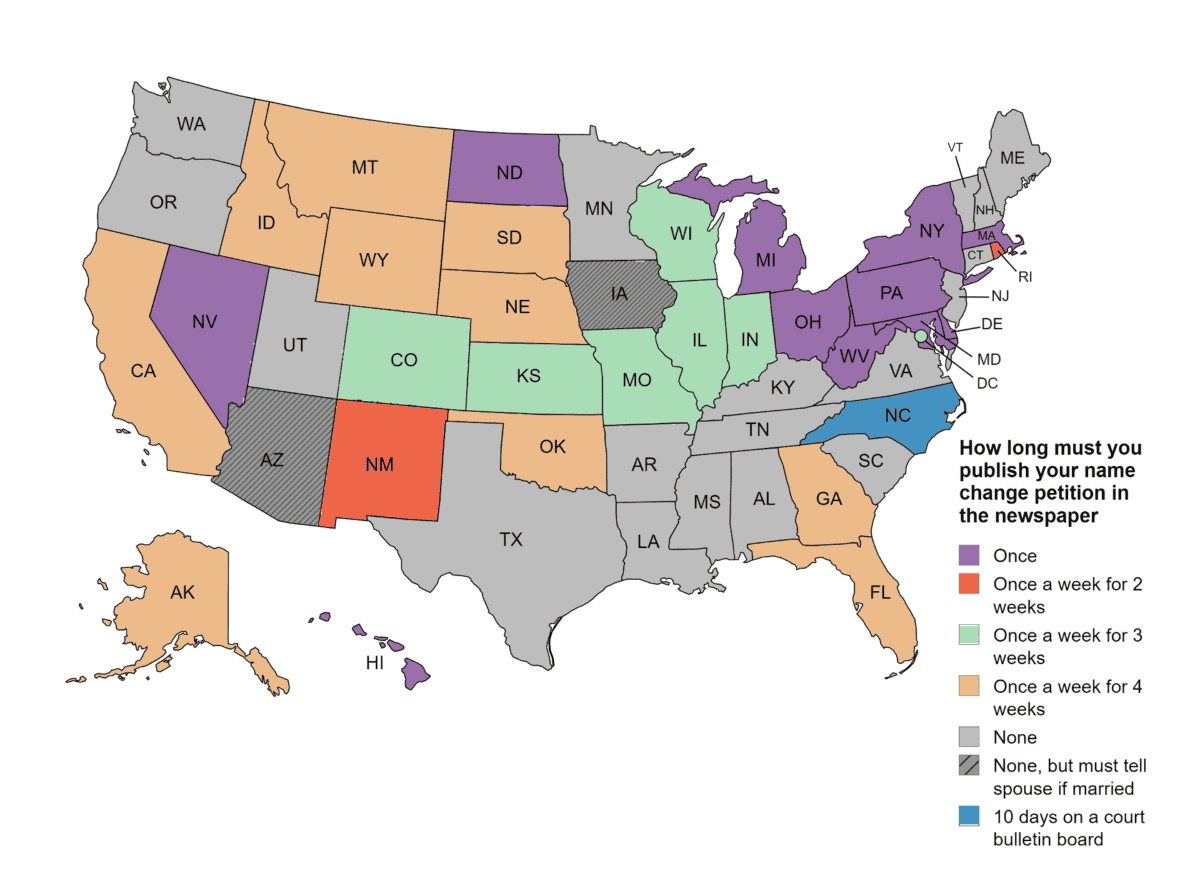Publishing Your Name Change in the Newspaper

If you want to change your name, but you cannot do it through marriage or divorce, you still have a practical path forward using a court-petitioned name change. But you may have to publish your name change in the newspaper.
Newspaper publication laws vary across states, including when and where to publish, duration, and exceptions for gender identity cases and concerns over privacy and safety.
This article focuses on everything related to newspapers and name changes, what you should expect, fees, exceptions, and state-specific publication rules.
We will also clarify which U.S. states do not require publication.
State law governs name change publication rules
Do you need this? If you can change your name through marriage, you do not need to endure court orders, newspaper publishing, or all else this article covers.
State legislatures write the laws (or statutes) which regulate name changes and newspaper notices. The courts (most often at the county level) just execute these directives.
Depending on your jurisdiction (where you live), the ease and procedures of name change, newspaper publication, and waivers vary.
Before continuing, we must dispel a common misconception…
Most anyone can adopt the name they want. In fact, by 2009, around 46 states allowed people to change their names by common law usage, without paperwork.
Yet this common law option crumbles under inspection.
Reality is oh-so different…
Federal and state government agencies, banks, and other institutions need official, legal proof of name change, such as a court order, not common law claims.

Beyond marriage, the most efficient way to get your name changed is through a court order applied in a state or county court where name change is universally accepted.
You only need to pursue a name change through a court order and newspaper publication if you do not have a marriage certificate or divorce decree capable of changing your name.
The right reason for your name change
When seeking a name change by court order, you must plead your reason is not fraudulent or illegal. For instance, defaming another person, or evading a debt or lien, among others.

Your rationale need not be elaborate. The court does not expect a monologue. Your motive could be as simple as you "just want a new name" because you dislike your current name.

The judge cannot deny your name change unless your reason is immoral, frivolous, or fraudulent. For instance, you cannot rename yourself Microsoft or a profane word.
Besides explaining why you want your name changed, you may have to pay a filing fee and post a legal notice in a court-approved newspaper announcing your old and new name.
Expect to pay two separate fees:
- Court petition filing fee
- Newspaper publication fee
Publishing a legal notice in newspapers
The main reason the law requires anyone who wants to change their name to publish it in a newspaper is to make it a public record. A searchable, archived, historic chronicle.
People whom you might owe statutory obligations have a legal right to know when you have changed or are changing your name, and how to mount formal opposition.
Announcing your name change in the papers does not imply you have something to hide. The law mandates publication to promote transparency and expose mischief-makers.

Otherwise, anyone can decide to change their name to avoid debts, commit fraud, or malign others. Publishing a newspaper notice is a legal and useful societal defense.
And, yes, your petition could get opposed in open court or judge's chambers. Yet whoever objects to your name change must possess three things:
- Awareness of your name change intentions.
- Knowledge of the court hearing.
- Good cause to object.
Publication fulfills the first two criteria. Showing good cause puts the burden of proof on objectors. Their claims must often get sent to the court in writing before the hearing.

Objections are rare. Still, broadcasting your name change objectives in print is the law. Your name change cannot move forward until the publication duration has run its course.
Publication contents, disclosures, and objections
Expect to publish your current name, proposed name, address; court hearing date, venue, case number, and objection instructions (how and when to file a challenge).
You may avoid exposing your home address to the public by hiring an attorney who will use their practice's address or discussing nondisclosure options with the court clerk.
You do not have to figure out the ad format and language yourself; the court will give you the completed notice or Order to Show Cause to pass onto the publisher.

Publication might be a onetime event, but most states mandate longer runtimes. The most common interval is tied between once and once a week for four weeks.
How long must you publish your name in your state?
You may view your own state's notice of name change newspaper publication duration in the following image map and table. (Keep in mind that multi-week runs are consecutive.)

| State | Publication duration |
|---|---|
| Alabama | None |
| Alaska | Once a week for 4 weeks |
| Arizona | None, but must tell spouse if married |
| Arkansas | None |
| California | Once a week for 4 weeks |
| Colorado | Once a week for 3 weeks |
| Connecticut | None |
| Delaware | Once |
| District of Columbia | Once a week for 3 weeks |
| Florida | Once a week for 4 weeks |
| Georgia | Once a week for 4 weeks |
| Hawaii | Once |
| Idaho | Once a week for 4 weeks |
| Illinois | Once a week for 3 weeks |
| Indiana | Once a week for 3 weeks |
| Iowa | None, but must tell spouse if married |
| Kansas | Once a week for 3 weeks |
| Kentucky | None |
| Louisiana | None |
| Maine | None |
| Maryland | Once |
| Massachusetts | Once |
| Michigan | Once |
| Minnesota | None |
| Mississippi | None |
| Missouri | Once a week for 3 weeks |
| Montana | Once a week for 4 weeks |
| Nebraska | Once a week for 4 weeks |
| Nevada | Once |
| New Hampshire | None |
| New Jersey | None |
| New Mexico | Once a week for 2 weeks |
| New York | Once |
| North Carolina | 10 days on court's bulletin board |
| North Dakota | Once |
| Ohio | Once |
| Oklahoma | Once a week for 4 weeks |
| Oregon | None |
| Pennsylvania | Once in 2 newspapers |
| Rhode Island | Once a week for 2 weeks |
| South Carolina | None |
| South Dakota | Once a week for 4 weeks |
| Tennessee | None |
| Texas | None |
| Utah | None |
| Vermont | None |
| Virginia | None |
| Washington | None |
| West Virginia | Once |
| Wisconsin | Once a week for 3 weeks |
| Wyoming | Once a week for 4 weeks |
Exceptions to publishing name change publicly
Exceptions exist where you might not have to publish a notice in the newspaper. For instance, you do not need to publish when conforming to your sex or gender identity.

Upon request and showing good cause, the court may waive the publication rule for victims of domestic violence, stalkers, sexual assault, or human trafficking.
People enrolled in an address confidentiality program or state witness protection program are exempt from the publication standard by default.
The above is not an all-inclusive list of exemptions the court will honor. Your reason may be different. Your concern need not have precedent; it can be a potential danger.
For instance, you can assert a right to privacy from publication because you believe you might be subject to harassment from known or unknown persons.
Getting a waiver in these cases is simple:
- You must document your reasons on the court forms.
- Most courts will not ask for proof.
Bottom line, the court may forgo publication if it might place your safety in danger, then move onto the hearing or final ruling.
The court may opt to conduct a closed hearing or no hearing if they waive publication of your name. They may even order court records sealed.
Avoiding harassment from strangers
Shielding your address could help filter out bad actors circling name change announcements. This may be useful for cross-gender name changes, victims of abuse, etc.
Consider getting a PO Box, private mail box (PMB), or virtual mail box (VMB) for your name change correspondence. But first check if the court allows a non-residential designation.
What if you prefer wide newspaper circulation?
Much of the context of this article—and historical inquiries we have received throughout the years—have framed name change newspaper publication as an undesirable step.

Yet not everyone wants their name change intentions concealed, minimized, and rushed through with little public attention.
Upon request, various newspapers specialize in wide circulation of legal name change announcements, across multiple papers and platforms, for maximum community recognition.
Publishing your name change notice
You will enter the publication phase once a judge signs an order allowing your name change petition to advance. (You are now inching towards the threshold.)
The signed order will show that you have X-days to take out an advert in a newspaper—referred to as a "publication"—which is an ad giving notice you will legally change your name.

In most cases, the order explains which newspaper the notice must appear, contents of the notice, and the number of times it must be published.
Various courts might handle the publication sequence on your behalf, but you must still pay the publication fee through them. Such aid is uncommon, though.
Contacting the newspaper
You may contact a local newspaper by phone or through their website. It should be a newspaper of general circulation where you live. Often at the county level.
Call the newspaper and indicate you want to take out an advertisement of a personal nature in the newspaper's announcements section and indicate both the new name and old name in the announcement while making it as clear as day your name has been changed.

Various states require an address listed alongside the announcement. The publisher will often insert your ad in the "legal notices" section of the classifieds ads.
If the court gives you free rein to pick a newspaper, make sure it meets the court's standards within your region, including:
- Minimum circulation
- Placement (e.g., legal section)
- Predominant language (e.g., English, Spanish)
The newspaper might publish your name change notice on both their physical paper and website. The latter risks permanent public exposure online.
Paying the newspaper legal notice filing fee
Payment arrangements are between you and the newspaper, not the court. They should be able to take a credit card payment by phone, online, or whatever means provided.

Courts can be merciful to low-income applicants. Often waiving the filing fee. Newspapers are not so forgiving and expect payment in full—no hardship waivers.
How much is the newspaper publication fee?
There are roughly 1,279 daily newspapers in circulation within the U.S. You can view newspaper ad rates by state, which offers a reasonable estimation for placing a legal name change notice in the classified section.

For example, the L.A. Times charges an astounding $1,317 to post a legal name change notice, while The Daily Commerce charges only $90.
Both newspapers are well-circulated within the same county, making either a valid choice for a resident placing a legal name change notice. Yet the price disparity is striking.
But you need not take the first price offered.
If the court provides you an accepted list of newspapers, you can shop around for the lowest ad rate. So if one quotes you a steep price, their competition may offer better terms.
On balance, it should cost you around $100 or less to publish your name change notice in a newspaper of general circulation within your geographic area.
Assuming you do your due diligence—comparison shop.
Newspaper affidavit of completion
The court may give you a signed order to be published as-is instead of only instructions. The sooner your name gets published, the sooner the newspaper will ready a publication affidavit as proof of completion.
The newspaper affidavit of completion protocol differs across states. The newspaper will either mail you the affidavit or send it straight to the court themselves.
Either way, see that it gets done before your hearing.
In fact, before the court's cited due date.

After you or the newspaper files the publication affidavit, your legal name change journey is nearing success; only the hearing and judge's approval remain.
Assuming no objections or suspicions of fraud arise, your name change should be a foregone conclusion. You may even get an approved court order without a hearing.
Publication done, now the real work begins
Once the judge approves and signs your court order, get certified copies from the court clerk to change your name everywhere: social security card, driver's license, passport, etc.

With publication done and court order in hand, you could even use our online name change kit to complete your name change across official documents and ID.
Publishing your name change in the newspaper may evoke trepidation, but is a necessary part of a court-petitioned name change campaign.
229 Comments